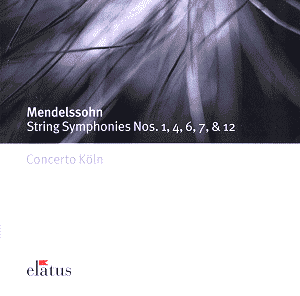Few composers, even the precocious young W.A.Mozart,
reached musical maturity with greater speed and confidence sooner
than Mendelssohn. The first six String Symphonies were written
in a single year when he was 14 years old and the remaining six
completed two years later. In all of them the influence of C.P.E.Bach,
then highly respected in Germany as a master of early Classical
forms, is evident. Yet, as a schoolboy, Mendelssohn shows the
inventiveness and technical confidence that carried him forward
to an illustrious, though sadly short, career as a leading European
composer. Even more remarkable, despite their formal structure
is the blossoming of the melodic and harmonic gifts he was to
show in his five great symphonies. These works are not in any
sense student compositions or pastiches, but adventurous essays
in what was, for Mendelssohn, a new and flexible idiom, and the
Concerto Köln (presumably without a conductor, since none
is mentioned) treats them as such. No. 7 from the second set is
ample evidence that Mendelssohn was not only relishing his craft,
but also anticipating the inventive imagination that marks his
later works.
Concerto Köln gives a lively, disciplined
performance with careful attention to the early classical style
reminiscent of C.P.E.Bach’s Hamburg Symphonies, rising effortlessly
to the lyricism of the more romantic slow movements. Tempi are
brisk, though not uncomfortably so. Together with the vivacity
and technical accomplishment of the fugal passages it all adds
up to a most attractive disc. It would be a mistake to regard
these early works as curiosities.
Roy Brewer
